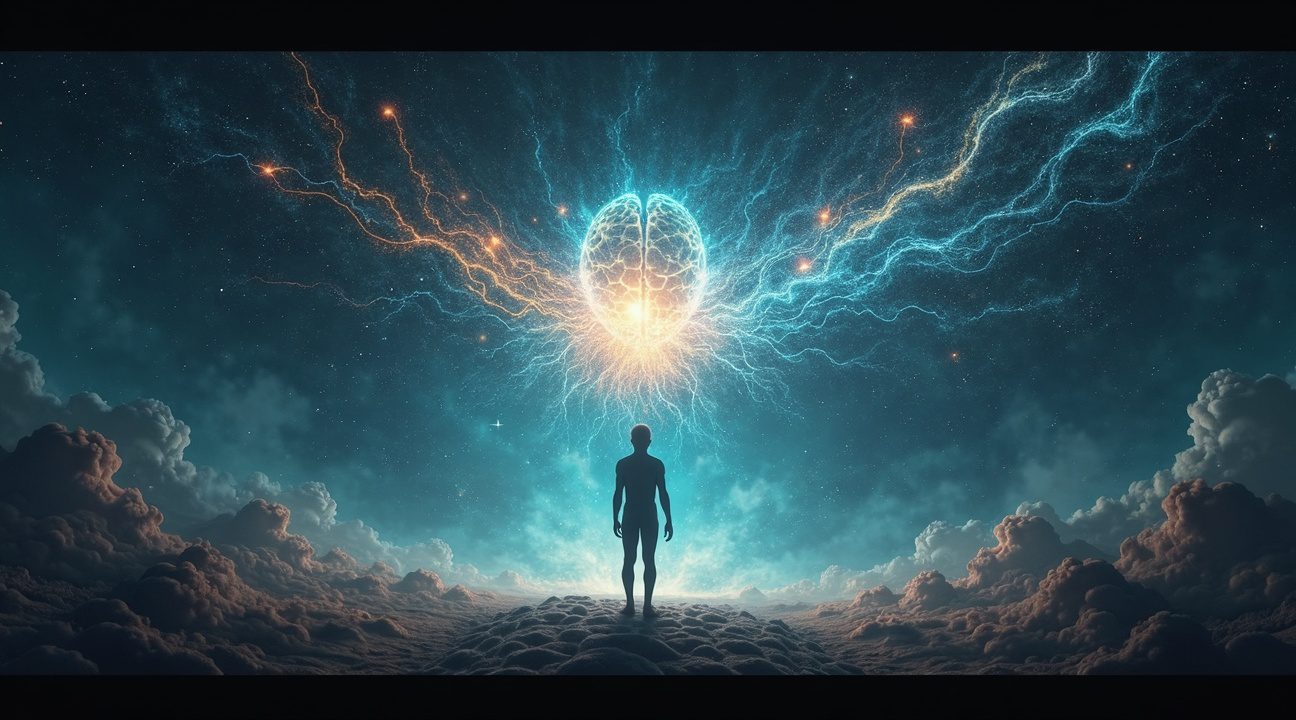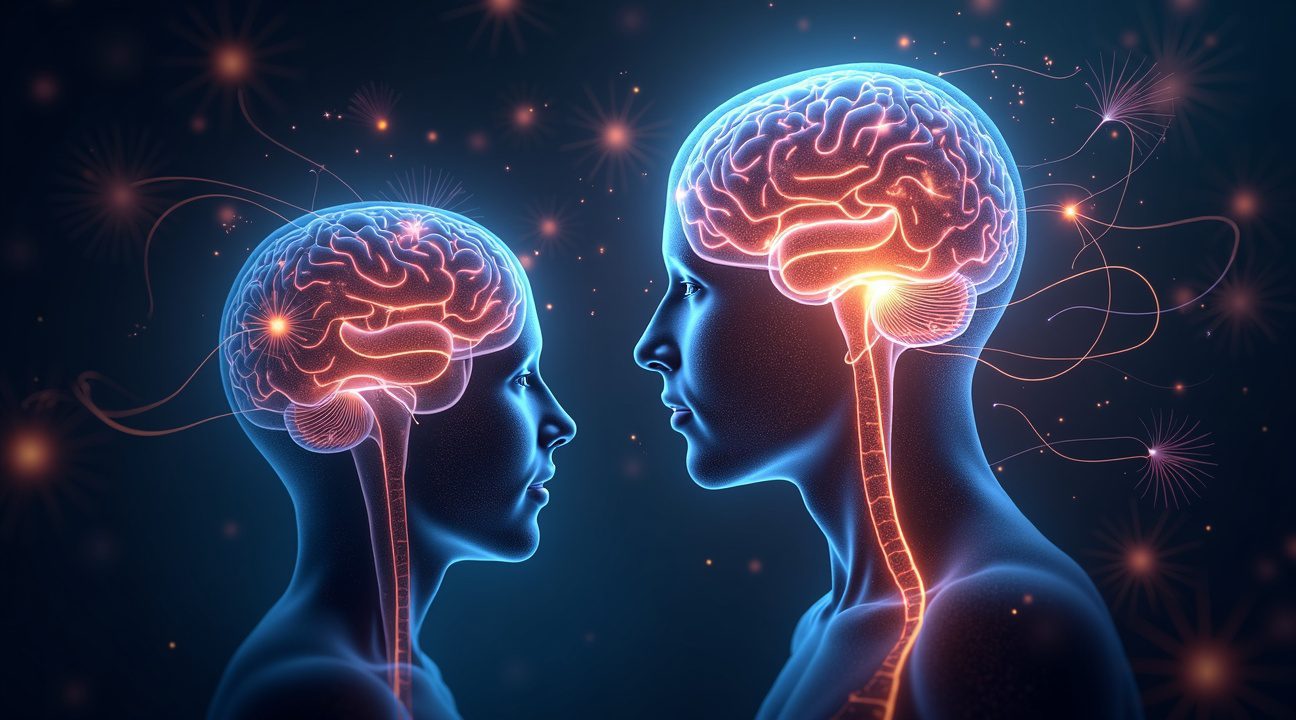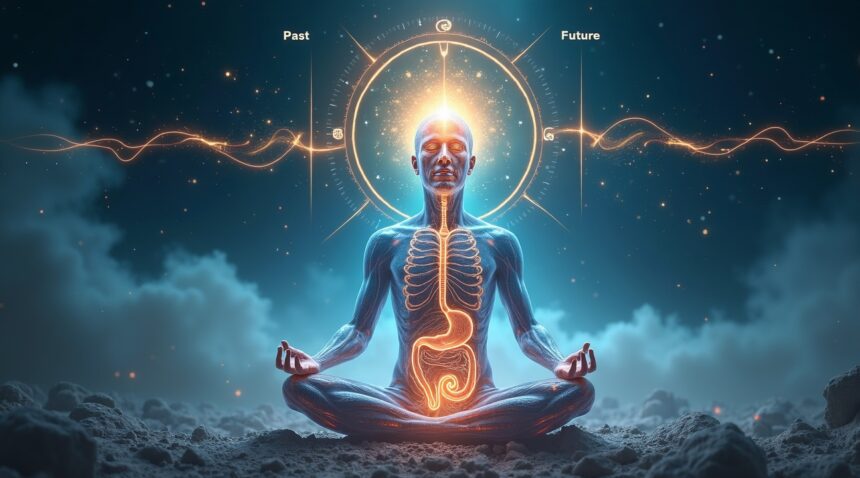Scientists are proposing a revolutionary theory that consciousness evolved specifically as a temporal navigation system, allowing organisms to distinguish between past, present, and future events for survival advantages.
Key Takeaways
- Consciousness may have evolved as a sophisticated temporal navigation system that helps organisms manage the flow of time by distinguishing between what has happened, what’s happening now, and what might occur next.
- Gut feelings could represent future memories bleeding through temporal boundaries, providing survival advantages by allowing creatures to respond to threats before they fully materialize.
- The brain’s unconscious processing power, which accounts for up to 95% of brain activity, might access temporal information that hasn’t yet manifested in conscious experience.
- The gut-brain axis operates as a bidirectional communication network through the vagus nerve, influencing decision-making processes and creating rapid assessments based on previous experiences.
- Scientific skepticism remains high due to inconsistent experimental results and the inability to reproduce precognition studies under controlled conditions, with mainstream researchers questioning claims about consciousness accessing future information.
This temporal consciousness theory reshapes how scientists view the relationship between awareness and time. Traditional neuroscience has long assumed consciousness processes information in real-time, reacting to stimuli as they occur. The new framework proposes that awareness functions as a sophisticated time management system, constantly sampling from different temporal zones to optimize survival decisions.
Research teams have begun examining how organisms might access future information through quantum mechanisms operating at the cellular level. These quantum processes could theoretically create bridges between different time states, allowing consciousness to preview potential outcomes before they manifest in physical reality. The theory gains support from studies showing that people often make decisions seconds before their conscious minds register the choice.
Neuroscientists are investigating whether the brain’s unconscious processing networks can detect patterns that haven’t yet emerged in conscious awareness. Early experiments suggest that neural activity sometimes spikes before external stimuli appear, indicating possible temporal bleeding between different awareness states. These findings challenge fundamental assumptions about causality and information flow in biological systems.
The gut-brain connection plays a central role in this temporal navigation theory. The enteric nervous system, containing over 500 million neurons, processes information independently of the central nervous system. This secondary brain might serve as an early warning system, detecting temporal anomalies and sending signals to the conscious mind through the vagus nerve pathway.
Studies examining intuitive decision-making reveal that people often sense outcomes before logical analysis confirms their hunches. Professional traders, emergency responders, and military personnel frequently report gut feelings that prove accurate despite lacking concrete information. These experiences suggest that consciousness might access temporal data through non-linear pathways that bypass traditional sensory channels.
Researchers are exploring whether DNA itself might function as a temporal information storage system. Genetic material could theoretically encode future possibilities alongside historical data, creating a biological time capsule that influences present behavior. This DNA-based temporal mapping could explain how organisms adapt to environmental changes before those changes fully manifest.
Critics argue that the temporal consciousness theory lacks sufficient empirical evidence. Controlled laboratory studies of precognition consistently produce mixed results, with effect sizes often falling within statistical margins of error. Mainstream neuroscientists emphasize that extraordinary claims require extraordinary evidence, particularly when challenging established principles of physics and biology.
The theory faces additional challenges from quantum decoherence research, which suggests that quantum effects dissipate too quickly in warm biological systems to support temporal information transfer. Brain tissue operates at temperatures that should destroy quantum coherence within nanoseconds, making sustained temporal bridges unlikely through known quantum mechanisms.
Alternative explanations for gut feelings focus on rapid pattern recognition rather than future access. The unconscious mind processes millions of sensory inputs continuously, creating predictive models based on subtle environmental cues. These models generate intuitive responses that feel like future knowledge but actually represent sophisticated pattern matching from accumulated experience.
Philosophical implications of temporal consciousness extend beyond neuroscience into questions about free will and determinism. If consciousness can access future information, traditional concepts of choice and causality require fundamental revision. The theory suggests that future states might influence present decisions, creating circular causal loops that challenge linear time assumptions.
Future research directions include developing more sensitive measurement techniques for detecting temporal anomalies in neural activity. Scientists are designing experiments that could isolate quantum effects in biological systems and determine whether consciousness operates through previously unknown physical mechanisms. Advanced brain imaging technologies might reveal temporal processing patterns that current methods cannot detect.
The temporal consciousness theory represents a paradigm shift in understanding awareness and time perception. While scientific validation remains incomplete, the framework offers a compelling explanation for phenomena that traditional neuroscience struggles to address. Continued research will determine whether consciousness truly functions as a temporal navigation system or whether simpler mechanisms account for apparent future access.
Scientists Propose Consciousness Evolved to Navigate Time by Distinguishing Past, Present, and Future
I find myself fascinated by emerging theoretical models that suggest consciousness didn’t just happen by accident—it evolved specifically to help organisms manage the flow of time. These groundbreaking frameworks propose that our awareness serves as a sophisticated temporal navigation system, allowing us to distinguish between what has happened, what’s happening now, and what might occur next.
The theoretical foundation rests on a fascinating three-part temporal structure. Scientists conceptualize the future as a vast field of potentialities—endless possibilities waiting to unfold. Think of it as a cosmic menu of options, where countless scenarios exist simultaneously until something tips the scales. The present represents the moment when certain potentialities become actualized, transforming from mere possibilities into concrete reality. Meanwhile, the past functions as an immutable record of those actualized events, creating the historical foundation upon which future decisions build.
This actualization process might occur through quantum wave function collapses, a phenomenon that bridges the microscopic quantum world with our macro-level experience. When these collapses happen, they don’t just affect particles—they influence the very form and structure of our awareness. I see this as consciousness operating like a quantum antenna, picking up signals from across the temporal spectrum and translating them into actionable insights.
Evolutionary Advantages of Temporal Awareness
The evolutionary benefits of this temporal consciousness become clear when examining survival scenarios. Organisms equipped with sophisticated time-navigation abilities can rapidly adapt their behavior based on temporal information. Consider how gut feelings might represent future memories bleeding through—these intuitive responses could provide critical survival advantages by allowing creatures to respond to threats before they fully materialize.
This system works by maximizing adaptive potentialities while simultaneously minimizing maladaptive ones. Animals with enhanced temporal awareness can:
- Anticipate predator movements before they occur
- Locate food sources by sensing future abundance patterns
- Navigate social hierarchies by predicting behavioral outcomes
- Avoid environmental hazards through temporal pattern recognition
The fitness advantages are substantial. Creatures that can effectively distinguish between temporal states gain significant survival benefits over those operating purely in the present moment. This temporal navigation ability becomes a powerful evolutionary driver, pushing consciousness to become increasingly sophisticated over time.
I find the concept of the psychological arrow of time particularly compelling. This refers to our subjective experience of time’s passage, which operates independently from objective physical processes. While physics shows us that time might be more fluid than we imagine, our consciousness creates a distinct directional flow that shapes our entire reality experience.
The psychological arrow differs dramatically from the thermodynamic arrow of time or the cosmological arrow. It’s purely experiential, emerging from consciousness itself rather than from external physical laws. This suggests that our sense of temporal flow isn’t just a byproduct of brain activity—it’s a fundamental feature of conscious awareness that evolved for specific survival purposes.
Modern research supports these ideas by showing how consciousness can access information across temporal boundaries. Studies reveal that people often receive accurate information about future events through intuitive channels, suggesting that our awareness can indeed jump through time to gather useful data. This aligns perfectly with evolutionary models showing that consciousness development followed pathways that enhanced temporal navigation abilities.
The implications extend far beyond academic theory. Understanding consciousness as a temporal navigation system helps explain phenomena like precognition, intuitive decision-making, and the uncanny accuracy of gut feelings. It suggests that what we often dismiss as coincidence or luck might actually represent sophisticated temporal processing operating below our conscious awareness threshold.
These theoretical models also connect with broader questions about dimensional reality and how consciousness might operate across multiple layers of existence. They provide a scientific framework for understanding experiences that traditional materialist science struggles to explain, opening new avenues for research into the true nature of awareness and temporal perception.

Gut Feelings May Actually Be Memories From Future Events, Researchers Theorize
I’ve always wondered why certain gut feelings feel so familiar, almost like I’ve experienced them before. Recent scientific theories propose that these intuitive sensations might actually stem from memories of future events, challenging our traditional understanding of consciousness and time. This fascinating concept connects with precognition and retrocausality theories, suggesting that our awareness isn’t confined to linear temporal boundaries.
The brain’s remarkable ability to perform mental time travel provides a foundation for these theories. Neuroscience research demonstrates that our minds constantly reconstruct past experiences while simultaneously simulating potential future scenarios. This process creates a complex web of temporal connections that might explain why certain situations trigger immediate recognition or unease.
The Unconscious Mind’s Role in Temporal Perception
Scientists have discovered that up to 95% of brain activity occurs unconsciously, creating vast processing power that operates beyond our immediate awareness. This unconscious activity supports advanced pattern recognition and intuitive awareness that might extend into future possibilities. The brain’s ability to process enormous amounts of information simultaneously could potentially access temporal information that hasn’t yet manifested in our conscious experience.
Deja vu experiences exemplify this phenomenon, where individuals feel certain they’ve lived through identical moments before. Rather than simple memory glitches, these experiences might represent consciousness briefly accessing future timeline information. The intensity of these feelings often surpasses ordinary memory recall, suggesting a different mechanism entirely.
Precognitive theories propose that consciousness operates outside conventional time constraints, allowing limited access to future events through subtle channels. This doesn’t necessarily mean predicting specific details, but rather sensing emotional or energetic patterns that will later manifest. The gut feeling that something significant will happen often proves accurate, even without logical reasoning supporting the intuition.
Retrocausality further expands these possibilities by suggesting that future events can influence present experiences. Advanced research in quantum mechanics already demonstrates backward-in-time influences at microscopic scales, raising questions about whether consciousness might operate through similar mechanisms.
These theories don’t claim that people can definitively predict the future, but rather that consciousness might occasionally receive fragments of temporal information. The brain then processes these fragments as familiar sensations or gut feelings, creating the experience of knowing something without understanding why. This perspective reframes intuition from mere guesswork to a sophisticated temporal sensing mechanism that deserves serious scientific investigation.
The Science Behind Gut-Brain Communication and Intuitive Decision Making
The gut-brain axis operates as a sophisticated bidirectional communication network that profoundly impacts how people experience emotions, make decisions, and process information. This connection extends far beyond simple digestion, influencing cognitive processes in ways that scientists are still discovering. The relationship between the digestive system and brain creates a foundation for understanding why individuals often describe certain intuitive responses as “gut feelings.”
How Interoception Bridges Internal Signals and Conscious Awareness
Interoception serves as the body’s internal monitoring system, constantly relaying information from various organs to the brain for processing and interpretation. This mechanism allows the nervous system to track physiological changes and translate them into conscious awareness. The gut contributes significantly to this process through specialized sensory receptors that detect everything from nutrient levels to microbial activity.
These internal signals travel through established neural pathways, creating a continuous stream of data that influences decision-making processes. The brain integrates this information with existing memories and experiences, sometimes producing what feels like an inexplicable knowing or intuitive response. This process happens largely below the threshold of conscious awareness, making it seem as though insights arise spontaneously.
The Vagus Nerve’s Role in Memory and Learning
The vagus nerve functions as a primary communication highway between the gut and brain, carrying signals that directly impact memory formation and cognitive function. These transmissions reach the hippocampus, a brain region essential for learning, memory consolidation, and pattern recognition. Research has shown that vagal nerve stimulation can enhance memory performance and support adaptive learning processes.
This connection helps explain why certain environmental cues or situations might trigger strong visceral responses before conscious recognition occurs. The gut’s sensory information combines with hippocampal memory processing to create rapid assessments of familiar patterns or potential threats. This system evolved as a survival mechanism, allowing organisms to respond quickly to environmental changes based on previous experiences.
Scientists have observed several key aspects of this gut-brain communication:
- Neural signals from the digestive system influence stress hormone release and emotional regulation
- Vagal nerve activity affects heart rate variability and breathing patterns during decision-making
- Gut microbiome composition can impact neurotransmitter production and mood regulation
- Inflammatory responses in the digestive tract correlate with changes in cognitive performance
While people commonly refer to intuitive experiences as “gut feelings,” the actual generation of emotions and conscious thoughts occurs within brain structures. The gut contributes essential physiological information that informs these processes, but the interpretation and emotional response happen in neural networks within the cranium.
The scientific understanding of this communication system continues to evolve as researchers explore connections between digestive health, mental clarity, and decision-making capabilities. Some studies suggest that individuals with stronger interoceptive abilities show enhanced emotional intelligence and better stress management skills. This research supports the idea that paying attention to bodily sensations can improve overall cognitive function and decision-making accuracy.
Modern neuroscience has revealed that the enteric nervous system contains over 500 million neurons, earning it the nickname “second brain.” However, this system operates more like an advanced information processing center than an independent thinking organ. It monitors local conditions, regulates digestive functions, and communicates findings to the central nervous system for integration with higher-order cognitive processes.
The interplay between gut sensations and brain activity creates a feedback loop that influences both immediate responses and long-term behavioral patterns. Understanding this relationship offers insights into how advanced processing systems might develop similar integrated approaches to information gathering and decision-making. The human experience of intuition represents a sophisticated biological system that balances rapid response capabilities with complex pattern recognition processes.

Mixed Research Results and Scientific Skeicism Challenge Precognition Claims
I’ve observed that precognition studies face significant challenges in producing consistent, reproducible results that meet rigorous scientific standards. Research attempting to validate precognitive abilities often yields mixed outcomes, with successful experiments rarely replicated under controlled conditions. This inconsistency has led mainstream scientists to remain skeptical about claims that consciousness can access future information.
Inconsistent Experimental Evidence
Studies examining gut feelings as predictive mechanisms frequently fail to demonstrate statistically significant results when subjected to peer review. I notice that many experiments claiming to show precognitive abilities suffer from methodological flaws, including inadequate sample sizes, poor controls, and selective reporting of positive results. Even when researchers report positive findings, independent laboratories often struggle to reproduce the same outcomes under similar conditions.
The scientific community’s skepticism extends beyond precognition research to related fields. Claims connecting gut microbiota to neuropsychiatric conditions, while intriguing, often lack the clinical validation necessary for acceptance in evidence-based medicine. I find that researchers frequently overstate preliminary findings about the gut-brain connection, particularly when discussing predictive capabilities.
Media Amplification and Public Misconceptions
Popular media outlets consistently amplify unsubstantiated claims about intuitive prediction and future memory, creating widespread misconceptions about these phenomena. I see journalists often misrepresenting preliminary research as definitive proof, failing to convey the tentative nature of early-stage scientific findings. This sensationalized coverage contributes to public confusion about what current science actually supports.
The gap between scientific evidence and popular belief becomes particularly apparent when examining how gut feelings are portrayed. While intuition can serve as a useful decision-making tool based on pattern recognition and subconscious processing, I observe that claims about its predictive power often lack supporting data. Research into phenomena like déjà vu provides more concrete neurological explanations than theories involving future memory access.
Current scientific understanding suggests that artificial intelligence shows more promise for predictive capabilities than human consciousness jumping through time. I recognize that while gut feelings can reflect accumulated experience and pattern recognition, treating them as windows into future events requires extraordinary evidence that hasn’t been provided.
Sources:
Scientific Research Publishing – “Facing Up to the Hard Problem of Consciousness: Could Quantum Mechanics Help?”
Frontiers in Behavioral Neuroscience – “The Gut-Brain Axis: Interactions Between Enteric Microbiota, Central and Enteric Nervous Systems”
Popular Mechanics – “Gut Feelings May Actually Be Memories From Future Events, Researchers Theorize”
Popular Mechanics – “Astounding Show Suggests Gut Feelings Could Be Memories From the Future”
Popular Mechanics – “Scientists Say Consciousness Might Reach Back in Time to Shape the Past”
Futura Sciences – “Your Gut Feeling May Really Predict the Future — Some Scientists Are Starting to Think So”
Wikipedia – “Mental time travel”
National Center for Biotechnology Information (NCBI) – “Gut–brain axis: Diet microbiome interactions and implications for modulation of anxiety and depression”
Frontiers in Psychology – “Unconscious Influences on Decision Making: A Critical Review”
AOL – “Can You Trust Your Gut Feeling? Some Scientists Suggest It’s a Memory From the Future”


